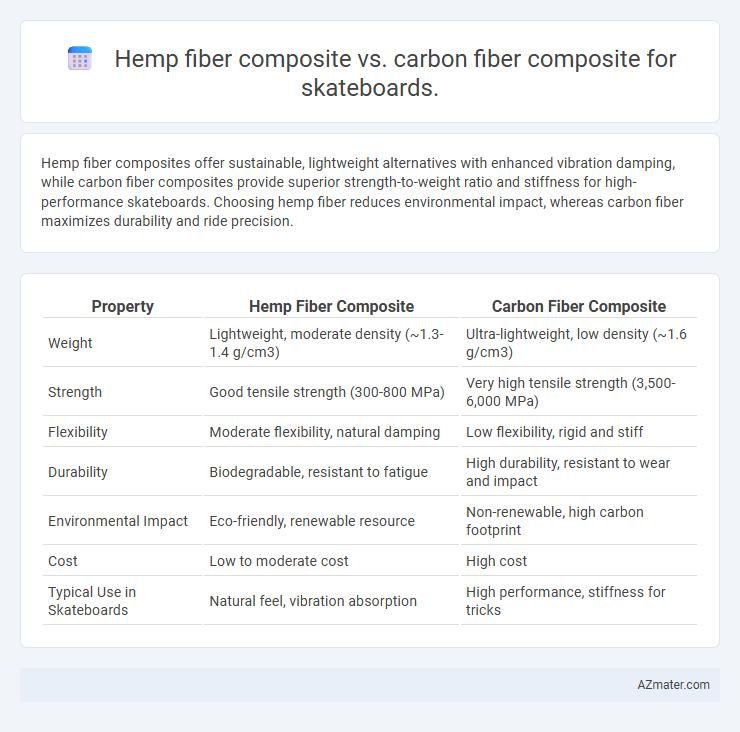Hemp fiber composites offer sustainable, lightweight alternatives with enhanced vibration damping, while carbon fiber composites provide superior strength-to-weight ratio and stiffness for high-performance skateboards. Choosing hemp fiber reduces environmental impact, whereas carbon fiber maximizes durability and ride precision.
Table of Comparison
| Property | Hemp Fiber Composite | Carbon Fiber Composite |
|---|---|---|
| Weight | Lightweight, moderate density (~1.3-1.4 g/cm3) | Ultra-lightweight, low density (~1.6 g/cm3) |
| Strength | Good tensile strength (300-800 MPa) | Very high tensile strength (3,500-6,000 MPa) |
| Flexibility | Moderate flexibility, natural damping | Low flexibility, rigid and stiff |
| Durability | Biodegradable, resistant to fatigue | High durability, resistant to wear and impact |
| Environmental Impact | Eco-friendly, renewable resource | Non-renewable, high carbon footprint |
| Cost | Low to moderate cost | High cost |
| Typical Use in Skateboards | Natural feel, vibration absorption | High performance, stiffness for tricks |
Introduction to Composite Materials in Skateboarding
Hemp fiber composites offer a sustainable and flexible alternative to carbon fiber composites in skateboard manufacturing by combining natural fibers with resin matrices for enhanced durability and shock absorption. Carbon fiber composites provide superior strength-to-weight ratios and stiffness, delivering high performance and responsiveness favored by advanced riders. Both materials demonstrate the evolving application of composite technologies to optimize skateboard deck resilience, weight, and ride quality.
What is Hemp Fiber Composite?
Hemp fiber composite is a sustainable material made by embedding hemp fibers into a resin matrix, offering high strength-to-weight ratio and natural vibration damping properties ideal for skateboard decks. Compared to carbon fiber composites, hemp fiber composites provide enhanced environmental benefits due to hemp's rapid growth and carbon sequestration capabilities, while maintaining sufficient durability and flexibility. Its biodegradable nature and lower production energy make hemp fiber composite an eco-friendly alternative without compromising performance.
What is Carbon Fiber Composite?
Carbon fiber composite is a high-strength material made from carbon fibers embedded in a polymer matrix, known for its exceptional stiffness, lightweight properties, and superior durability. It provides skateboard decks with excellent impact resistance and responsiveness, enabling advanced performance and longevity. In comparison, hemp fiber composites offer a more sustainable and flexible alternative but generally lack the same level of strength and stiffness as carbon fiber composites.
Strength and Durability Comparison
Hemp fiber composites offer exceptional tensile strength and impact resistance due to their natural fiber structure, making them highly durable for skateboard decks under repetitive stress. Carbon fiber composites provide superior stiffness and higher strength-to-weight ratios, enabling enhanced performance and lightweight durability, but they can be more prone to brittle failure under extreme impact. The choice between hemp and carbon fiber composites depends on the desired balance of flexibility, weight, and long-term durability in skateboard construction.
Flexibility and Ride Feel
Hemp fiber composites offer enhanced flexibility and a softer ride feel compared to carbon fiber composites, making them ideal for riders seeking more board responsiveness and shock absorption. Carbon fiber composites provide superior stiffness and strength, resulting in a more rigid ride that maximizes energy transfer but can feel harsher on rough terrain. The balance between flexibility and durability in hemp fiber composites caters to comfort-focused skateboarders, while carbon fiber suits performance riders prioritizing precision and speed.
Environmental Impact and Sustainability
Hemp fiber composites offer a significantly lower environmental impact compared to carbon fiber composites, as hemp is a renewable, biodegradable resource requiring less energy-intensive processing and producing fewer greenhouse gas emissions. Hemp fiber composites contribute to sustainability by promoting carbon sequestration during hemp cultivation and enabling end-of-life composting or recycling, whereas carbon fiber composites are derived from petroleum-based materials and are challenging to recycle effectively. The use of hemp fiber composites in skateboard manufacturing supports circular economy principles and reduces reliance on non-renewable resources, making them a more eco-friendly alternative to carbon fiber composites.
Weight and Performance Differences
Hemp fiber composites offer a lightweight alternative to carbon fiber composites, typically weighing 20-30% more but providing superior flexibility and impact resistance ideal for skateboard decks. Carbon fiber composites excel in stiffness and strength-to-weight ratio, resulting in enhanced performance for precision and speed but can feel less forgiving under high stress. The choice between hemp and carbon fiber impacts the skateboard's overall durability, responsiveness, and ride comfort, with hemp favoring shock absorption and sustainability while carbon fiber emphasizes maximum performance and lightweight rigidity.
Cost and Accessibility
Hemp fiber composites offer a cost-effective alternative to carbon fiber composites for skateboards, with raw hemp fibers being significantly cheaper and more environmentally sustainable. Carbon fiber composites provide superior strength-to-weight ratios but come with higher material costs and limited accessibility due to complex manufacturing processes. Hemp composites enable easier sourcing and affordability, making them a practical choice for budget-conscious skateboard manufacturers and eco-friendly consumers.
Innovations and Industry Trends
Hemp fiber composites are emerging as sustainable alternatives to traditional carbon fiber composites in skateboard manufacturing, driven by increasing demand for eco-friendly materials. Innovations in bio-based resin systems and enhanced fiber treatments have improved hemp composites' strength-to-weight ratio, making them competitive for performance skateboards. Industry trends highlight a shift towards incorporating natural fibers like hemp to reduce environmental impact while maintaining durability and flexibility.
Choosing the Right Composite for Skateboards
Hemp fiber composites offer excellent vibration damping and eco-friendly sustainability, making them ideal for riders seeking a natural alternative with moderate strength and flexibility. Carbon fiber composites provide superior stiffness, high tensile strength, and lightweight performance, preferred by professional skateboarders demanding maximum responsiveness and durability. Choosing the right composite depends on balancing environmental impact, ride comfort, and performance requirements specific to the skateboarder's style.

Infographic: Hemp fiber composite vs Carbon fiber composite for Skateboard
 azmater.com
azmater.com